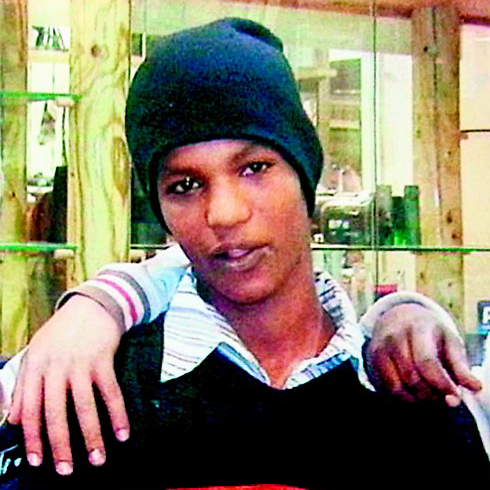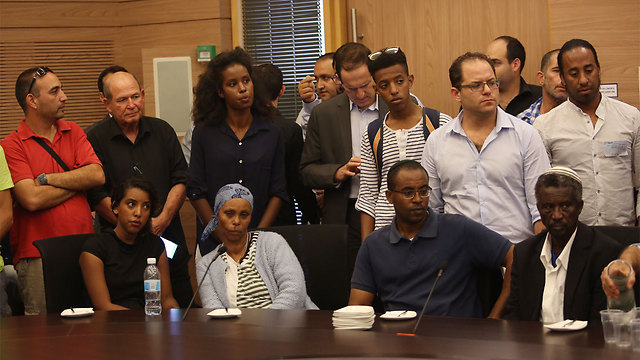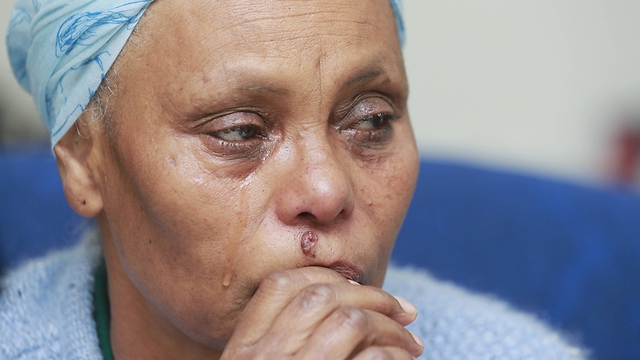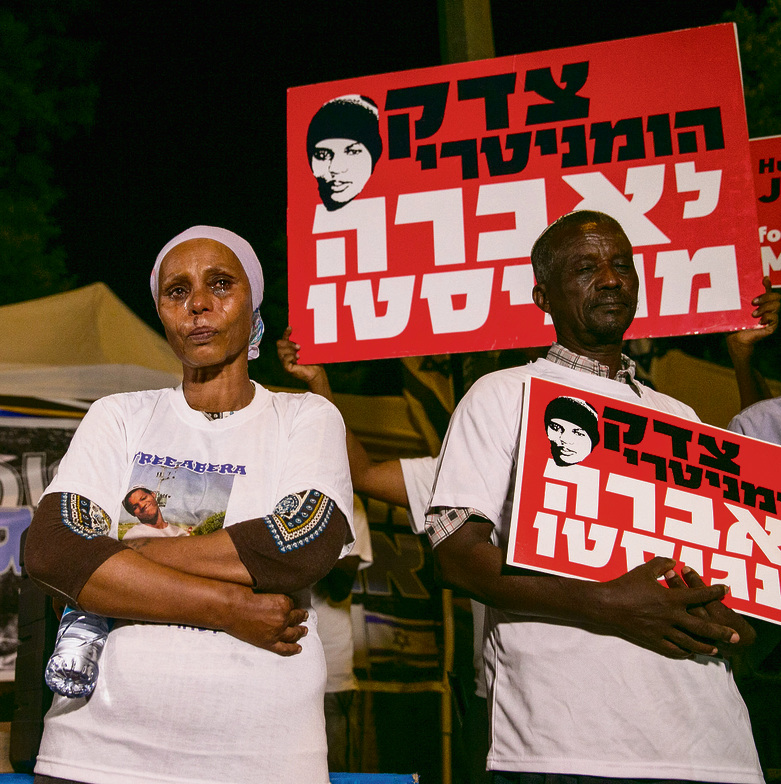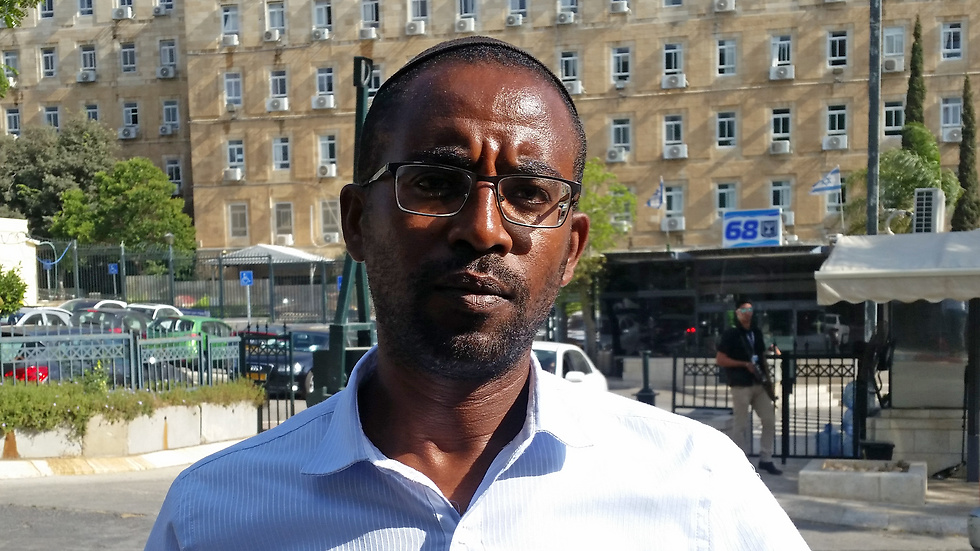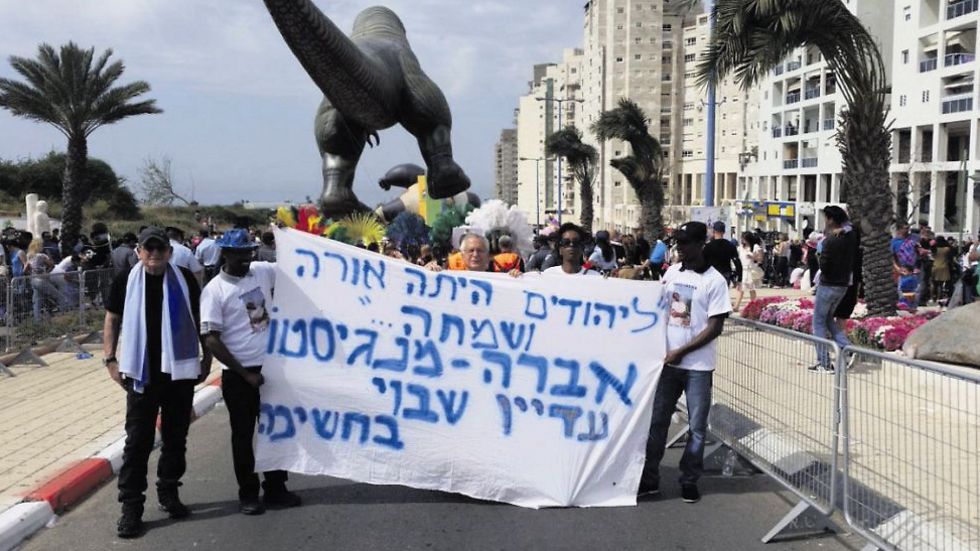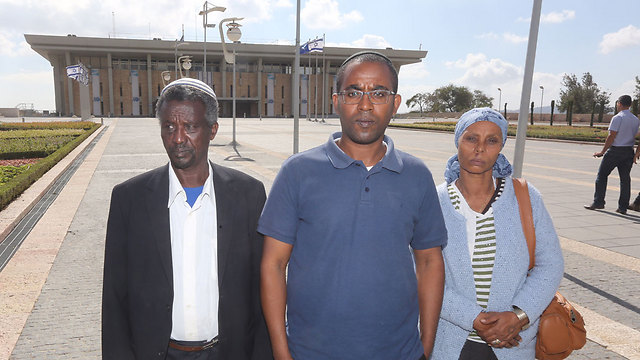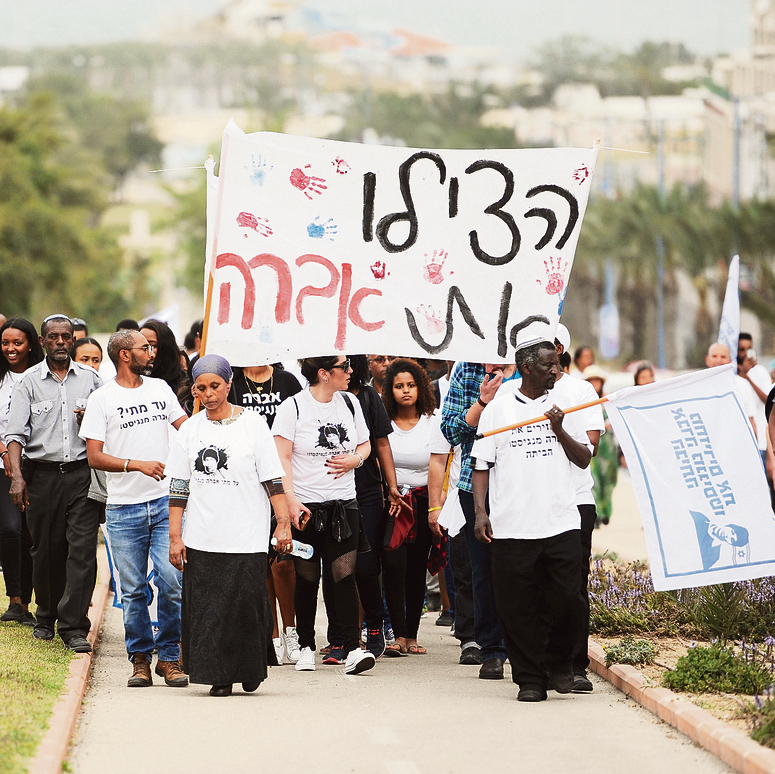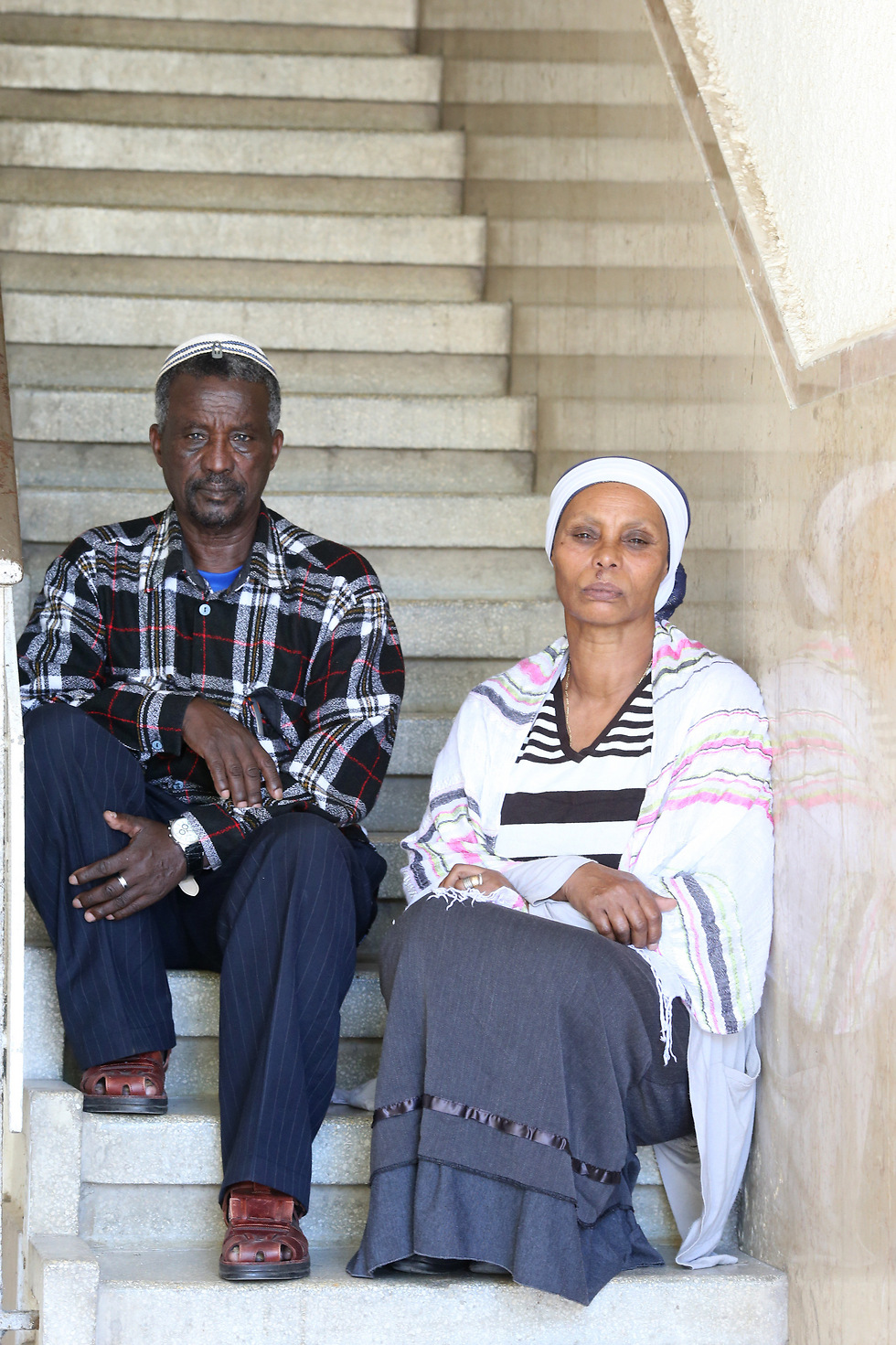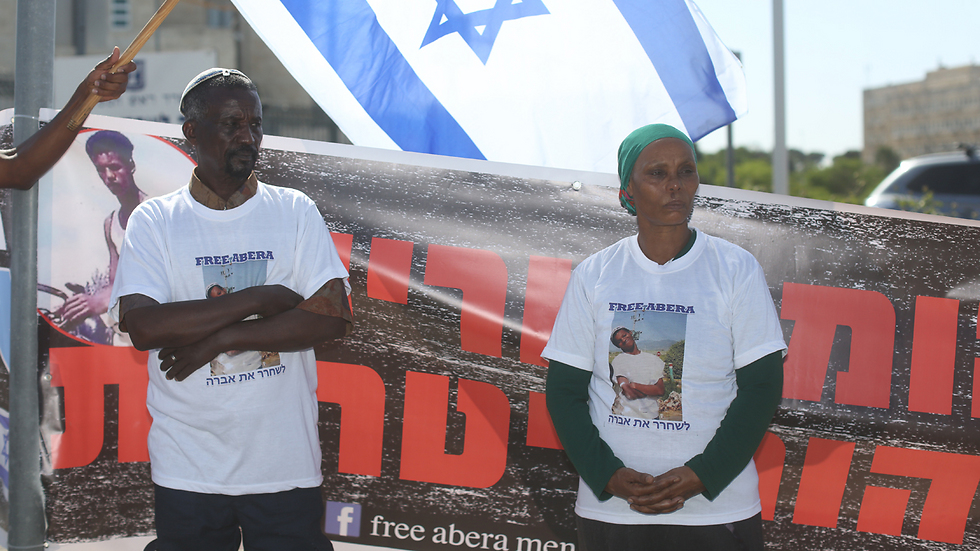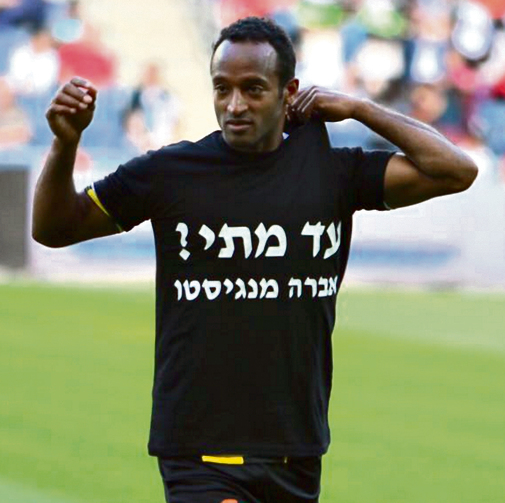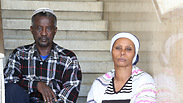
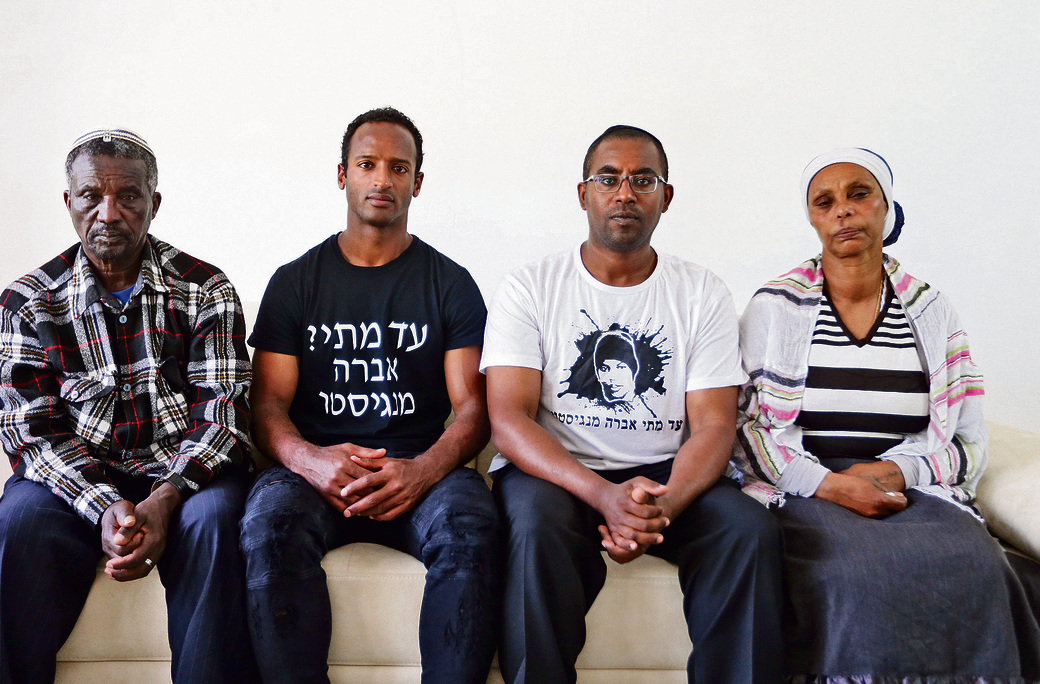
1,000 days in Hamas captivity
On Saturday, Abera Mengistu will have spent 1,000 days in Hamas captivity in Gaza. His family still knows nothing of his situation. Soccer player and social activist Imaye Taga met with Abera's family for a heartbreaking interview about the ceaseless worrying and the hurt they feel at the fact both the government and majority of the public seem to have forgotten all about their son.
On Saturday, June 3, Mengistu will have spent 1,000 days in captivity in Gaza. He crossed the border into the strip on September 7, 2014, and has been there ever since. In that time, you probably got married and had a baby, maybe two. You went on vacation and then on another one. You've worked, traveled, rested, spent time with your family, met with friends. Did whatever you wanted, whenever you wanted, without being told what to do.
Over the past 1,000 days, Abera Mengistu most likely did not get to do any of these things. Even if he wanted to—and surely he did—he simply could not. Imagine you were in his place. Actually, forget it, there's no way you can. I'm not even sure you even want to. Because Abera Mengistu is an other, not like you. He's black.

To bring back Gilad Shalit, the State of Israel—and many of us as private individuals—did everything. Celebrities joined the struggle, masses marched and rallied, the media reported on it day in and day out. And rightly so. And now? Complete and utter silence.
You can say it's because his family is not making a lot of noise. Well, when you are trampled on, as a group and as individuals, it's a bit hard to make noise. And it's always the weak ones that are easiest to silence, scare, blame. Just hint to them that if they talk and protest and try to move heaven and earth, it will hurt their son. On other families, whose color is different, this would not have worked.
The latest painful example of this happened last week, unfortunately from the man who is supposed to be the most stately of all, President Reuven Rivlin. In his meeting with US President Donald Trump, Rivlin showed him the photos of Hadar Goldin and Oron Shaul, IDF soldiers declared dead whose bodies are being held in Gaza, and stressed the importance of returning the bodies home, to be buried in Israel.
This is a worthy and important cause. But hold on, there are also two living Israeli citizens held in Gaza: Abera Mengistu and Hisham al-Sayed. Why didn't the honorable president show their photographs to his American colleague? It would be hard to convince me there is a different reason other than the fact the two—one Ethiopian and the other Bedouin—simply do not belong to the right tribe, but rather to the disappearing, transparent fringes of Israeli society.
I met with Agernash and Ayaline Mengistu, Abera's parents, and with his brother Ilan, to try and understand, along with them, what is happening to us, as a society. How is it that almost no one cares about the fact a young Israeli man, who is suffering from mental problems and needs help, has been in Hamas captivity in Gaza since September 2014 for almost 1,000 days.
Read this and listen to us, those who shout on behalf of the missing people whom no one hears. Don't silence us with excuses, because we have no intention of being silent. For a thousand days now, a brother of mine has been in Hamas captivity. He can't give interviews, write angry Facebook posts, or plead his case to the Israeli public himself.
And my brother is also your brother.
'We believed the government would act'
We meet at the Mengistu family home in southern Ashkelon. It's a small apartment, inside an old railways building, where they've been sitting for almost three years waiting for Abera to return. The apartment is meagerly furnished, almost empty. There is no crowd-funding campaign to raise money for their struggle. There's no "operations room," as we've seen in other similar struggles.
Every few minutes Agernash, the mother, bursts into tears, struggling to close the floodgates. Ayaline holds back his tears, but not his anger. He's angry at the government, at human rights organizations, at us. Most of the time, their son Ilan has to hold their hand through this terrible darkness.
"The darkness is the same darkness, and the disappointment is the same disappointment," Ilan says when I ask him for a situation report. "We don't have any information about Abera except for the basic fact that he is being held by Hamas. We don't know what his health or mental situation is. We don't know if he's eating or sleeping. Nothing."
"My day has also become like darkness," Agernash says, nodding. "I can't find my soul, I can barely sleep. I think about nothing but Abera all day. What's going on with him, is he alive, how he is feeling. With God's help, when he comes back home, my son would be reborn.
"Three years is a long and difficult period of time for a sick guy who goes into Gaza. I'm sure if this were Bibi's (Prime Minister Neyanyahu—ed) son, he would've gone to Gaza himself to bring him back, even if he had to dig into the ground. Our children have all been very close to each other, and we're all, with great sadness, waiting for Abera. We deal with the pain and difficulty together, praying he comes back home."
Is there a government representative to keep you updated?
"There is a representative, but I don't know how much they're actually doing," Ilan says. "We're in touch by phone and every now and again we have meetings, but we feel like the meetings are just for the sake of meeting. Just to say we've met. It doesn't give us anything. I told the representative this as well: We, the family, care more about the efforts the government makes for my brother. Thank you very much, really, for the meetings, but it's not giving me anything. Unfortunately, in my brother's case, they're not even trying."
In hindsight, do you think the first ten months, when you didn't go public at the request of the government, were in vain? Would you have done anything differently?
"There's no doubt. Looking back, the most critical time was the days right after he crossed the border. At the time we believed the government would work covertly, do what needs to be done, and that staying quiet would justify the end. That was our greatest mistake. Maybe if we had shouted and gone public from the beginning, we would have had information about his situation today, what's going on with him. It was a mistake, but when you hear from government officials and from the IDF that being quiet would help—you believe them."
Do you think you've been misled?
"I think they keep trying to buy time. Keep my brother's case quiet. I have no doubt this is intentional. This is a humanitarian case the government should have cried out about on the international stage and used human rights organizations. But nothing happened. Total silence."
Did you expect the public or the government to join the cause?
"There were ten months during which very few people knew what was going on, because we were not allowed to talk and had hardly any information anyway," Agernash says. "Time went on, and meanwhile no one helped us with anything. The Red Cross, for example, helps many civilians all over the world. I remember they used to help in Ethiopian as well, and in Israel they visit (Palestinian) security prisoners. But they have no information about our son. If he's dead, where is the body? If he's alive, tell us. What harm can Abera even cause?"
"Our suffering is twofold," says Ayaline. "It's not enough that we're living in uncertainty about his mental situation, the prime minister doesn't pay the family any mind. If he had at least met with us or updated us, we would've been spared a lot of suffering and pain. Sometimes, a little attention is worth a lot, even if he has nothing new to offer us. Unfortunately, the prime minister has forgotten he is responsible for Abera's life and for bringing him home. My son deserves basic human rights. A lot of citizens were in captivity and in distress, and the State of Israel has made great efforts to rescue them. Is my son different? Is he not Jewish? Is he not Israeli? Is he not a person? When disaster strikes elsewhere in the world, Israel is the first to help. But it is incapable of helping my son, who is not far from here."
Ilan bemoans the fact that "they didn't even appoint a person, a political figure, who would turn to countries with ties to Hamas and the ability to influence the organization. They're waiting for some miracle to happen, or for time to go by and for us to forget."
'No one remembers us'
It's not just the government, of course. We, as citizens, have the power to make the government act, to do everything, try every possible way, to bring Abera home. In Gilad Shalit's case, there was a long campaign that generated considerable public pressure, which eventually led to a deal. Without debating whether or not that deal was good or the right thing to do, the fact of the matter is that many of Israel's citizens expressed solidarity with the Shalit family, while almost no one remembers the Mengistu family."We don't have the financial means to run a campaign," Ilan says. "We don't have the ability to meet with all sorts of people, create pressure. The government knows this, and it serves their interests. As long as there is no public pressure, and there is no one to demand Abera's return except for us, why should they act?"
And what about the Red Cross?
"It's the saddest thing. All of these organizations are waving the banner of human rights, but in my brother's tragic case they don't come to help. They claim they are doing something, but when they're asked what has been done so far, they evade the question. Just like the government: pretty words, but in reality they don't do anything. It's very disappointing to learn there are some human lives that are worth more and some that are worth less.
"I see how frustrated my parents are, my mom barely functions. This is someone they've raised, and we don't even have a shred of information about him. Two weeks ago, for the first time, one of the human rights organizations issued a condemnation against Hamas for holding my brother in isolation. The government didn't address that condemnation. Didn't welcome, didn't attack—nothing. This is an organization that normally condemns Israel and here, when it's doing their job for them, they remain silent."
The way I see it, Abera's story is the story of the Ethiopian community in Israel when it comes to the public's involvement and the treatment by the state. It shows what the Israeli society thinks about us, me and you, as members of the Ethiopian community.
"There's no doubt about it," Ilan says. "If this were a white person, at least in terms of solidarity, you'd see a lot of people support and identify with the family. You don't see that for us, except for a few devoted activists who have been accompanying us. There's still a long way to go until the public expresses solidarity with us, like in other cases. It's very painful for me."
You also have qualms with the Ashkelon municipality for not lifting a finger to help you.
"To this day, the municipality hasn't done anything. Nothing. Abera, and us, are residents of the city—and they're not helping us at all. We wanted, for example, to hold rallies. We asked them to help us secure a place, but nothing. Complete and utter indifference.
"We also don't get any support from artists in Israel. Normally, artists express solidarity, release a song, dedicate a concert. As artists, they always deal with cases of injustice. I see singers participate in any fundraiser they're asked to do. That's a good thing. I love seeing everyone pitching in. But in our case, I don't see or hear anything from them. They've lost their voice. This is their place to act. Good Lord, there's a civilian who hasn't been heard from in 1,000 days, my brother. The family is falling apart, we carry this suffering 24 hours a day, my parents are worried—and no one comes to help. Why are things like this?"
As someone who has been active in the struggle to release Abera, I quite often hear the argument that the reason Mengistu's case hasn't received the same amount of attention as the missing soldiers is because Abera crossed the border of his own accord.
It appears that people have forgotten Elhanan Tannenbaum, who also entered Lebanon of his own accord, and Israel still paid a steep price to Hezbollah for his return. And what they also seem to have forgetten is that unlike Tannenbaum, who was of sound mind, Abera was suffering from known mental issues.
"My brother went through a difficult time after our brother, Michael, passed away," Ilan says. "Abera and Michael were very close and he was mentally affected by Michael's passing. He even had to be hospitalized twice. His judgment was completely impaired. He didn't choose to cross the border. I'm sad to hear things like that. Since when do you judge a person in emotional distress? Even, heaven forbid, in cases of people with mental issues who committed murder, the court takes that into consideration. So why is Abera being blamed for crossing of his own accord?"
Right under their noses
Unlike the great majority of Israeli citizens, during their months of silence the Mengistu family got to see the security footage showing their son crossing the border into Gaza.
"You don't see much there," Ilan admits. "Just him walking on the beach, entering Gaza. At the time, because of all of the pain, I didn't even dwell on the question how he managed to cross the border, and I haven't seen the video since."
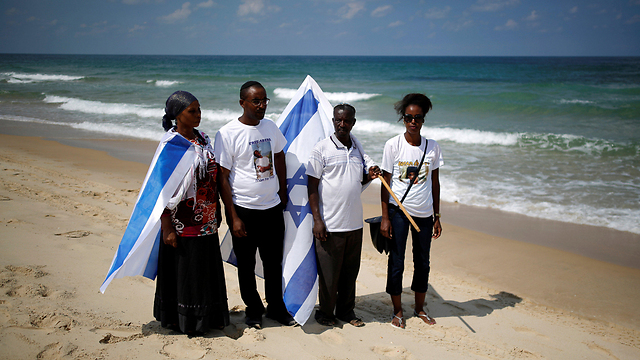
"There was a failure," Ayaline determines, "the fact they let him cross just like that, without trying to stop him or check who he was and why he was there."
"It is a failure by the soldiers there," Ilan agrees. "Abera went right under their noses, but to this very day there hasn't been an inquiry team appointed and no one has been punished. Not too long ago, some Lebanese citizen crossed the border into Israel, and the IDF demanded an investigation. But for us, when a man crossed the border right in front of them, there is no investigation."
Didn't the fact a man was crossing the border like that raise any red flags? What did they say about that?
"They explained to us that the IDF lookouts thought it was a foreign worker or a Sudanese refugee. There were a lot of failings. But to the best of our knowledge, the issue hasn't been properly investigated, so we don't know exactly what happened there."
To me it seems racist to think it would be okay to say something like this to you because they don't think you'd cause a commotion. Maybe we need to start within the community. Let our religious leaders, which we know are highly respected in the community, lead the protest.
"Could be. I believe that if the (Ethiopian community's) religious leaders come together and the community is united, it would have an impact. But I wouldn't absolve the human rights and mental health organizations from supporting us. I'd expect them to lead as well, or to at least come and show their support."
We blocked the Ayalon Highway once, perhaps we should do it again. Let them know we're here.
"When it comes to us, the family, we've already publicly come out against the government over a year ago. They're the main ones responsible, in our eyes. Any civilized nation needs to take care of its citizens, protect the life of its children. That is the message we keep coming back to. The government needs to bring him home, and perhaps there is really no escape from taking special action. We need to do everything for my brother to bring him back home alive and well. Everything.
"I want to use this stage to call on the public to support the family and join the struggle. This is a man's life we're talking about. I ask of you, I beg you, don't buy into the lie the government is trying to sell, that if we just behave and sit quietly and not cause a scene it would help bring my brother Abera back. It's a complete lie. It's been a thousand days and we still don't even have a shred of information about his situation. Help us break this silence and cry out everywhere, demand his return."
Agernash breaks out in tears again. "Abera went into Gaza because he was sick," she says in tears. "He wasn't holding a weapon; he even left his bag behind. He didn't even serve in the army. Gilad Shalit had support, help from the state. He also has a French passport so another strong nation supported him. We don't have anyone to help. We're completely alone, and it lays heavy on us 24 hours a day."
Ilan really does dedicate his life to his brother's plight. Every day he spends most of his time working for Abera's return, while at home in Ashkelon his wife and two young children (a 4.5-year-old boy and a three-months-old girl) only get to spend a little quality time with him. His young daughter hasn't even met her captive uncle.
"They're still young," Ilan says. "The eldest is only four. I don't talk to them about this a lot, and they really don't understand this hole, Abera's absence, because he's been gone longer than they've known him. I miss my time with the children, and when I'm home I try to make up for what I've missed. It's not easy, but no one would've abandoned their brother."
No regrets
Agernash and Ayaline Mengistu dreamed of Jerusalem. They arrived to Israel after a difficult journey, gave up their culture and their roots. They did everything to come here. They lost their son Michael (the fourth, with Abera being the fifth, out of four sons and three daughters) due to a medical complication, while their other son is trapped and no one knows how he is. How would I feel in their place? I don't know. I'm not sure I wouldn't have just given up on this place, asking myself if I even needed this.
"If the government of Israel doesn't help its citizens, why does it exist?" Agernash says in anger. "We do everything we can, everything in our power, for Abera. We were asked to stay quiet so as to not hurt the state's efforts, and it didn't help at all. Where is he? What's going on with him? Only God knows.
"It's very hard for us in Israel. As an adult, you know how to conduct yourself and how to act, but we thought the education in Israel would be the same as it was in Ethiopia. We thought there'd be solidarity. There, if a guest had shown up in the evening time, we'd stand next to him holding a candle until he finished eating. We did everything happily and with love towards one another. In Israel, there are great difficulties and no solidarity. I didn't think we'd encounter such injustice and inequality in the Jewish state of all places."
Do you regret making aliyah?
"These values we were raised on, that the people of Israel care for one another, may have blown up in our faces, but despite the difficulties and great suffering we go through every day as a family, I have no regrets. I've realized my ancestors' dream to go to Jerusalem."
"This is the land our ancestors dreamed of," Ayaline concurs. "No matter what problem arises, the State of Israel has an army, weapons and a prime minister. This is such a strong nation, but if the government can't help you, what is it good for? My son is supposed to be just like the prime minister's son, and receive the same treatment. As far as I'm concerned, it all begins and ends with the government."
And that's the story of the Mengistu family and of us in the Ethiopian community. It has been proven time and again over the last few years that we get treated differently. We are expected to keep quiet and say thank you we were even brought here. Immigrants from other countries don't get treated like that by the government. If anyone asks me, there is no doubt in my mind: The reason for this is the color of our skin. If Abera's name was Avi, and Hisham was Shimon, if their last names were a little less foreign to the ear, if one was white and the other Jewish—would their fate be the same? Would you have dismissed the story with a click of the tongue and flip the page over to the next article, while they rot in captivity?
On Saturday, one thousand days will have passed in which Abera's parents and siblings haven't seen even a trace of him. We can't remain silent anymore.
Responses
The Prime Minister's Office offered the following response, "Abera Mengistu crossed the border into the Gaza Strip in September 2014. Based on information obtained by Israel, he was captured by Hamas security forces in the Gaza Strip. Since then and to this very day, Israel works ceaselessly in different ways to find out what happened to him and to bring him back to Israel. This includes intelligence activity, both covert and overt. As part of the state's efforts, for example, the Mengistu family members travelled to Europe and met with senior representatives from the UN, the Red Cross and several other countries."In reality, Hamas has been ignoring the numerous requests made to it through various channels and is unwilling to provide any information as to the fate and situation of Abera. Prime Minister Netanyahu keeps abreast of the situation and is leading all efforts in this matter. The coordinator for missing and captive Israelis, Lior Lotan, and his team maintain constant communications with the family to update them on every development and aid them with their every need throughout the entire time.
"The State of Israel places the full responsibility for Abera's fate on the Hamas leadership and will continue acting tirelessly to complete the mission and return Abera home."
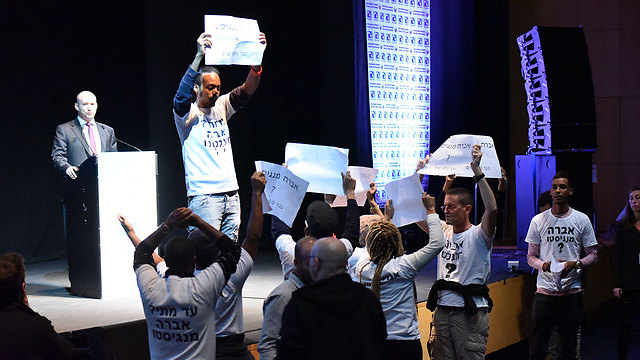
The President's Residence offered the following response, "The president embraces and accompanies the Mengistu family and works tirelessly and at every relevant opportunity to return Abera home. He will continue to do so in the future."
The Askelon municipality offered the following response, "The acting mayor, Tomer Glam, has instructed the relevant bodies to examine the Mengistu family's claims and aid them with whatever necessary to make it easier on them during this difficult time."
Imaye Taga, who wrote this story, is a soccer player for Maccabi Netanya and a social activist. A year and a half ago he walked onto the pitch wearing a shirt that says "How long Abera Mengistu?" The Israel Football Association decided to give him a NIS 750 fine. In a response that made headlines, Taga arrived at the association's offices accompanied by the Mengistu family and paid the entire fine with 7,500 coins of 10 agorot (cents/pennies).














